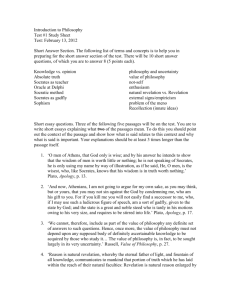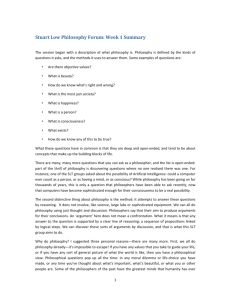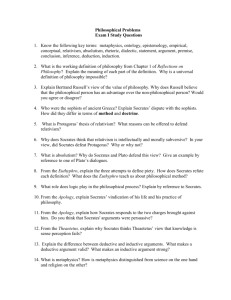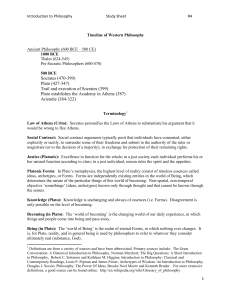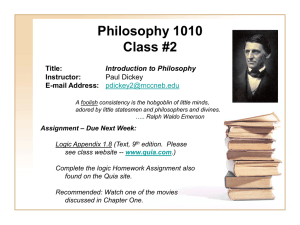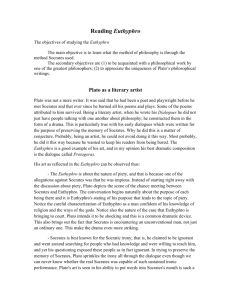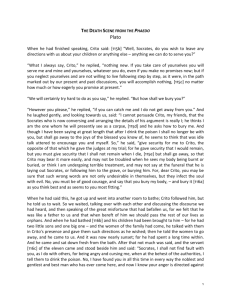PHIL 211-51 Introduction to Philosophy
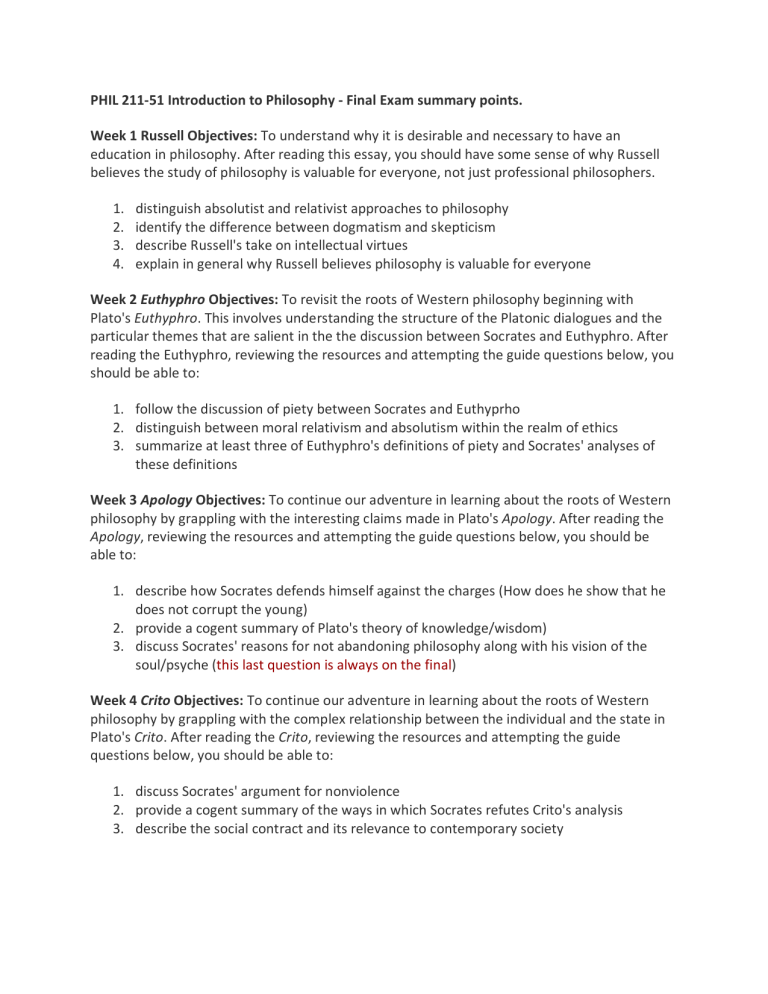
PHIL 211-51 Introduction to Philosophy - Final Exam summary points.
Week 1 Russell Objectives: To understand why it is desirable and necessary to have an education in philosophy. After reading this essay, you should have some sense of why Russell believes the study of philosophy is valuable for everyone, not just professional philosophers.
1.
distinguish absolutist and relativist approaches to philosophy
2.
identify the difference between dogmatism and skepticism
3.
describe Russell's take on intellectual virtues
4.
explain in general why Russell believes philosophy is valuable for everyone
Week 2 Euthyphro Objectives: To revisit the roots of Western philosophy beginning with
Plato's Euthyphro . This involves understanding the structure of the Platonic dialogues and the particular themes that are salient in the the discussion between Socrates and Euthyphro. After reading the Euthyphro, reviewing the resources and attempting the guide questions below, you should be able to:
1.
follow the discussion of piety between Socrates and Euthyprho
2.
distinguish between moral relativism and absolutism within the realm of ethics
3.
summarize at least three of Euthyphro's definitions of piety and Socrates' analyses of these definitions
Week 3 Apology Objectives: To continue our adventure in learning about the roots of Western philosophy by grappling with the interesting claims made in Plato's Apology . After reading the
Apology , reviewing the resources and attempting the guide questions below, you should be able to:
1.
describe how Socrates defends himself against the charges (How does he show that he does not corrupt the young)
2.
provide a cogent summary of Plato's theory of knowledge/wisdom)
3.
discuss Socrates' reasons for not abandoning philosophy along with his vision of the soul/psyche ( this last question is always on the final )
Week 4 Crito Objectives: To continue our adventure in learning about the roots of Western philosophy by grappling with the complex relationship between the individual and the state in
Plato's Crito . After reading the Crito , reviewing the resources and attempting the guide questions below, you should be able to:
1.
discuss Socrates' argument for nonviolence
2.
provide a cogent summary of the ways in which Socrates refutes Crito's analysis
3.
describe the social contract and its relevance to contemporary society
Weeks 5-8 Focus on the following guide questions
Plato: The Myth of the Cave
1.
The cave is an allegory for everyday reality. Who are the prisoners?
2.
What kinds of activities do the prisoners engage in? How does this compare to our present experiences with popular imagery?
3.
Plato describes the process of the prisoner being liberated from the chains. Is this a voluntary liberation?
4.
Why does the prisoner have to return to the cave? Since we have established that the remaining prisoners will not welcome his return, why should we send this liberated prisoner back?
Aristotle: The Good Life
1.
What part of the soul ought to control appetite?
2.
Describe Aristotle's vision of happiness. Is this the common vision?
3.
Explain the three lifestyles as outlined by Aristotle. How do they correspond to
Plato's description of the soul as chariot?
4.
There are three types of ends: instrumental, intrinsic and ultimate. Describe each and give an example of a situation in which we might value each sort of end.
5.
How is goodness or virtue acquired?
6.
What is the connection between happiness and virtue?
Week 9 Ramakrishna, Butler & Buddhist Ethics Objectives: To understand the basic differences between Eastern and Western philosophy via a survey of basic Hindu and Buddhist concepts.
After completing the assigned readings, reviewing the resources above and attempting the guide questions below, you should be able to:
1.
describe the key assertion by Sri Ramakrishna concerning the validity of all religious paths
2.
be able to make a distinction between the requirements for proof in philosophy and religion respectively
3.
understand the terms karma and dharma
4.
describe how the Four Noble Truths of Buddhism provide the foundation for Buddhist
Ethics
Mike Butler: An Introduction to Buddhism ( download the essay here )
1.
What is karma and how does it work?
2.
How are we to overcome ignorance
3.
List the Four Noble Truths and describe how each one effects our karma and continuing process suffering.
4.
Review the Eightfold path for ending desire and describe the what is meant by the term "correct livelihood."
Tenzin Gyatso, The Fourteenth Dalai Lama
1.
Explain the difference between true compassion and conditional love.
2.
Explain the idea of universal altruism.
3.
Why is the energy of anger "almost always unreliable?"
4.
According to the Dalai Lama, why should we feel grateful to our enemies?
Weeks 10 & 11 Kant & Mill Objectives: To understand the basic differences between deontological and utilitarian ethics as demonstrated in the works of Kant and Mill. After completing the assigned readings, reviewing the resources above and attempting the guide questions below, you should be able to:
1.
explain Kant's notion of the good will and its connection with duty and obligation
2.
distinguish between a categorical versus hypothetical imperative
3.
describe the concepts of universality, consistency and reversibility as they apply to the categorical imperative
4.
generate categorical imperatives for any situation
5.
distinguish between the higher and lower pleasures in Mill's ethics
6.
explain the GHP and how it works in altruistic utilitarianism
7.
describe the differences between deontological & utilitarian ethics (see the chart below the guide questions)
Week 12 Focus on all of the guide questions as there were few for this week.
Simone de Beauvoir: On Freedom and Morality
1.
How do we assert our freedom?
2.
Why ought we to will freedom for others?
John Paul Sartre: Freedom and Responsibility
1.
What does Sartre mean when he states that "we are condemned to be free"?
2.
Why is there no "non-human situation"?
3.
Sartre claims that world events such as war also belong to us in that we choose how we will react to them.
Weeks 13 & 14 Rawls & Young Objectives: To understand the basic components of John Rawls' theory entitled, "justice as fairness" and Iris Young's position on the relationship between merit pay and social justice in the workplace. After completing the assigned readings, reviewing the resources above and attempting the guide questions below, you should be able to:
1.
explain how the original position and the veil of ignorance work to ensure a fair starting point for ethical debates
2.
describe how the principle of equal liberty, the difference principle and the maximin solution are used to generate rules considered fair
3.
describe Young's critique of merit pay and the evaluation process
4.
list the reasons why Young feels merit pay is unworkable with regards to objectivity

